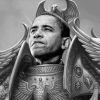Poelmo wrote:China has actually interfered in civil wars already
Directly, or are you talking about the provision of arms and such? The latter is harder to fit into a traditional colonial definition as colonial and non-colonial powers do business with factions in civil conflicts for all sorts of reasons. Prior to colonisation and even during, guns (often of dubious quality) would be traded with the natives for other goods. It also potentially fits a Cold War model with proxy conflicts, and while elements of how the Cold War played out in the post-colonial world had some similarity with the activities of colonial powers, I think it was different in character as well as structure.
Poelmo wrote:several governments are in their pocket through debts
Controlling governments through their debts and similar economic levers as far as I know if actually a relatively recent phenomena, it's probably something we could say that became more prominent in the post-colonial world. Colonial powers didn't really bother with the debts of their subjects, those costs were part of the administration of empire.
Poelmo wrote:others rely on China as protectorates
Protectorate usually implies a legal status (often the result of a treaty), and I'm reasonably certain there isn't an example of this in China's case. Even the defacto status of colonial protectorates, where the local government rules essentially on behalf of the colonial power, is probably stretching it a bit. China doesn't actually have a strong enough interest in the general affairs of most African states to go to that extent - they're more interested in the raw materials.
Poelmo wrote:then there are the port towns you mentioned
But as I mentioned those ports don't really fit into the idea of trading posts - small stop over points essentially on the edge of 'Darkest Africa' (or anywhere else thought remote) where goods could be had that the people manning the trading post have acquired from the locals (likely via trade). The ports that China is building up in the Indian Ocean are not to facilitate trade with the locals but more as waypoints for trade goods on their way back from Africa and the Middle East. I suppose these new overland trade routes could be seen as similar to the Panama Canal or maybe Russia's railway concessions in Manchuria, but as far as I know the Chinese don't have extra-territorial rights in these new ports etc.
The comparison with coaling stations also doesn't entirely work either, as those tended to follow on from colonial possessions, not be a form of colonialism themselves. You couldn't really have a coaling station in territory you didn't already control (in contrast to the trading post) and they were there to extend the operational capacity of your fleets, which were typically in existence to support empire.
Poelmo wrote: the growing presence of Chinese civilians and property in other countries which China could use as an excuse to send troops in times of crisis (like many (ex-)colonial powers have done).
This assumes that they're there as part of a grand plan rather than being the 'natural' result of economic activity. Although I suppose parallels could be drawn between the Russians who had moved into Siberia prior to Russia conquering it. They mostly went in to facilitate the fur trade, but those trade links ended up being a draw which sucked the Russian government into just annexing Siberia. The difference is really only one of scale, and that probably has a lot to do with China's particular economic and labour situation.
















 - By wat0n
- By wat0n - By Tainari88
- By Tainari88